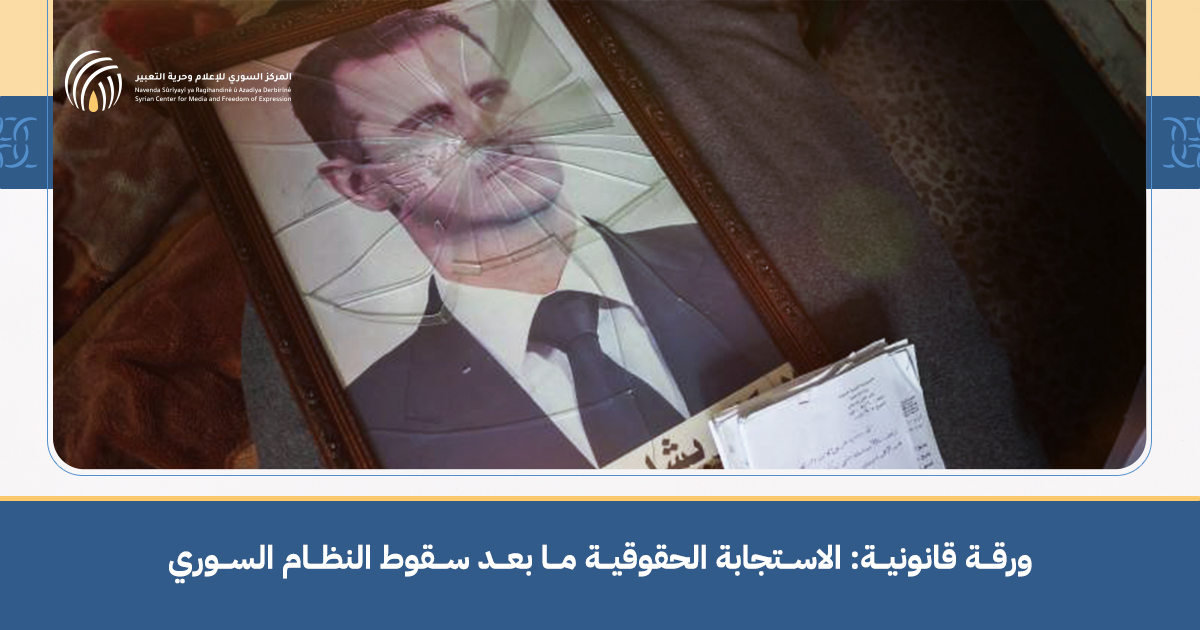After more than five decades of violence and repression, including over a decade of unprecedented bloodshed, the Syrian people have ended a long era of dictatorship and persecution. With the fall of the regime, a historic opportunity has emerged to rebuild social bonds, restore respect for free expression, equality, and human dignity, and foster a renewed sense of community. This pivotal moment calls for laying the foundations of transitional justice and social peace, emphasizing accountability, cultural renewal, and the rule of law.
A coalition of Syrian civil society organizations has released a detailed legal document outlining essential steps for achieving justice, reconciliation, and political stability in a post-conflict Syria. The document underscores the need for comprehensive measures to protect evidence, establish accountability, and support societal healing. The signatories call on the interim government and military leadership to prioritize these efforts to ensure a democratic transition.
Key Recommendations:
- Protecting Evidence and Sensitive Sites
- Immediate closure of former regime detention centers and security offices to safeguard critical records and evidence.
- Preservation of documents and forensic evidence relating to missing persons, mass graves, and sites of torture, in cooperation with victim advocacy groups and civil society organizations.
- Adherence to international protocols for the identification and excavation of mass graves, ensuring the integrity of evidence for future prosecutions and truth commissions.
- Facilitation of international investigative teams to document potential mass grave sites and other critical evidence.
- Establishing a Temporary Judicial Body
- Formation of an independent judicial committee of trusted legal professionals to oversee justice processes.
- Monitoring and organizing the release of detainees while documenting those previously held in criminal detention.
- Creation of a national database for missing persons, combining data from civil society groups and families of victims.
- Implementation of measures to secure evidence from former government officials suspected of human rights violations or corruption.
- Strengthening International and Domestic Cooperation
- Full collaboration with international mechanisms, including the International, Impartial and Independent Mechanism (IIIM) and the UN Commission of Inquiry on Syria.
- Facilitation of access for UN agencies and humanitarian organizations to address the country’s dire humanitarian needs.
- Recognition of the role of Syrian civil society organizations by easing administrative barriers to their operations and supporting their integration into local efforts.
- Supporting Released Detainees and Families of the Missing
- Provision of immediate medical and psychological care for recently released detainees and their families to aid in their recovery and reintegration into society.
- Establishment of temporary support centers across provinces to assist survivors and document cases of missing and forcibly disappeared individuals.
- Ensuring Access to Information
- Encouragement of citizens to submit documents obtained from former regime offices to designated authorities, with guarantees of anonymity and protection.
- Development of a centralized platform for public access to non-classified government decisions and documents to counter misinformation and promote transparency.
Civil Society Voices
The document, endorsed by over 40 organizations, reflects the collective vision of Syrian civil society to lay the groundwork for justice and accountability. Among the signatories are the Syrian Center for Media and Freedom of Expression, the Syrian Network for Human Rights, and the White Helmets. Their call to action is rooted in the belief that a future Syrian state must be built on the principles of justice, human rights, and inclusivity.
The Path Forward
While the road to peace and democracy is fraught with challenges, this document offers a clear framework for addressing the legacies of Syria’s tumultuous past. Its implementation, however, depends on the commitment of all Syrians, particularly those in positions of leadership, to uphold justice and ensure a stable transition toward the long-awaited Syrian state.
The statement was signed by a host of legal and human rights organization including: Syria Center for Media and freedom of expression, Pro-justice, Syrian Network for Human Rights, The Syria Campaign, LDHR, Caesar Families Association, and dozens more.
This article was translated and edited by The Syrian Observer. The Syrian Observer has not verified the content of this story. Responsibility for the information and views set out in this article lies entirely with the author.


